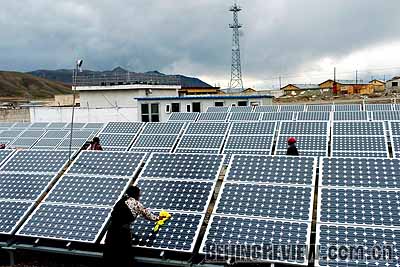|

The world's leading green energy prize, Ashden Award for Sustainable Energy, announced on June 19 that China's Renewable Energy Development Project (REDP) was among its latest recipients. The REDP was jointly launched by the National Development and Reform Commission of China and the World Bank in 2001, with an international grant provided by the Global Environment Facility.
The project aims to promote the installation of photovoltaic (PV) solar home systems in remote off-grid homes in nine west China provinces and to improve the quality of production of PV modules and other system components. It also provides free information about PV and facilitates cooperation between the PV sector in China and the rest of the world.
Since its inception, the REDP has enabled sales of more than 402,000 PV solar-home systems to rural people, who live off the land by tending yaks or other animals in remote areas of the western and northwestern parts of China, through a subsidized program.
With the systems, around 1.6 million people, who live in tents for at least several months in a year and previously had little access to electricity, now have an improved living conditions featuring better lighting, communications and entertainment equipment, which are ideally suited to the lifestyle of these semi-nomadic users.
"We bought the system just in time for the Spring Festival (Chinese lunar New Year) in 2007," said a yak herder from Inner Mongolia. "We had the money saved up from selling fungus. It's so much better than before-we used to just have candles. It's good for charging the phone, and for music. It's good that we can carry it with us."
A typical solar home system supplies two lights, a radio and a mobile phone charger, and comes in a metal carry-case so that it is portable. Larger systems can power radio-cassettes, televisions and DVD players. For users, the main benefit of the REDP is brighter, cleaner lighting, for study, work and recreation.
The REDP also supports some village-based PV systems to provide electricity for public facilities, such as schools and health centers.
The REDP has boosted the PV industry in China, improving the quality of production while keeping costs low. It has also greatly expanded the market for solar home systems, and prompted the formation of a network consisting of suppliers, wholesalers and retailers.
"The project has been of enormous economical and social significance to the people living in remote and poor areas in China," said Sarah Butler-Sloss, founder of the Ashden Awards.
The REDP was one of the six pioneering renewable energy projects from Africa, Asia and Latin America that each received a prize of 20,000 pounds ($40,000) at the Ashden Awards ceremony in London.
At the ceremony, India's Technology Informatics Design Endeavour was announced the winner of this year's title and given a prize of 40,000 pounds ($80,000). Bangladeshi Grameen Shakti won the 2008 Outstanding Achievement Award and a prize of 15,000 pounds.
The Ashden Trust, a Britain-based charity, founded the Ashden Awards for Sustainable Energy in 2001. The competition is held annually to identify and reward outstanding and innovative projects in Britain and developing countries, which provide renewable energy and improve energy efficiency at a local level. | 